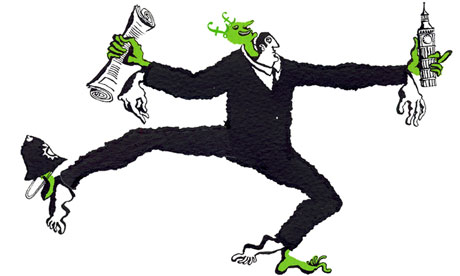Murdoch's grip on British politics was the product of corporate control of the press. Ending it is a democratic necessity.

Illustration by Belle Mellor
You'd have to be a "real fantasist", George Osborne declared this week, to believe there had been a "vast conspiracy" to hand full control of the satellite broadcaster BSkyB to Rupert Murdoch. David Cameron, who's due to appear before the Leveson inquiry into press standards on Thursday, has said something similar. The Tory culture secretary and "minister for Murdoch" Jeremy Hunt, who lobbied with cringe-making enthusiasm for the takeover, insisted he abandoned all partisanship the moment he was put in charge of adjudicating the bid.
When Tony Blair flew to pay homage to Murdoch's court in 1995, he didn't need to spell out that he'd be dropping Labour's plans to limit cross-media ownership for the tycoon to get the message – any more than the Scottish National party leader, Alex Salmond, had to sign an undertaking that he'd lobby for the BSkyB bid in exchange for support from the Murdoch press.
Not only has the backdoor lobbying and elite backscratching been laid bare at the inquiry, while Murdoch executives, journalists and police officers have been arrested and charged. But Murdoch's mythology that he has "never asked a prime minister for anything" and leaves editorial policy to his editors has also been mercifully disposed of.
Today John Major recalled that the media baron demanded he change government policy on Europe or his newspapers wouldn't back the Tories at the 1997 general election, while the former Sunday Times editor Harold Evans has described how Murdoch dictated coverage on everything from the economy to foreign policy.
With Tory leaders making clear their opposition to any statutory role in press regulation, Lord Justice Leveson will struggle to go beyond a slightly more independent body than the patsy Press Complaints Commission, and some redress for victims of media intrusion or misrepresentation. Crucially, there is little chance of his inquiry delivering a significantly more accountable media because, as he said today, he is anxious not to get into the fundamental issue of ownership.
But as the evidence to the inquiry has demonstrated, it's the corporate ownership of the press and media – and News International's dominant share of the market, delivered by Margaret Thatcher and reinforced by Blair – that gave Murdoch his mafia-like grip on politics and shaped the media's reporting of everything from Iraq to financial deregulation.
Which is why Ed Miliband's demand today to set limits to cross-media ownership and the share of the newspaper market controlled by one proprietor (also backed by Major earlier in the day) represents a significant break with two decades of political class deference to the media monopolists. Added to the promotion of different forms of ownership – even more important in the digital era – that would start to widen media freedom and diversity.
Of course, the British press has long been plagued by monstrous proprietors. In recent times, its owners have been particularly noted for their criminality, from Robert Maxwell to Conrad Black; Muslim-baiting and pornography, in the case of Express Newspapers' Richard Desmond; and tax-exiled feudal reclusiveness, in the shape of the Telegraph group's Barclay brothers.
But whereas press barons always tried to influence politics, that extended in recent years to rewriting media regulation in their commercial interests. And when it comes to the content of their papers and websites, the same sort of approach has translated into selling advertisers the right to incorporate their "messages" and "brand themes" into unlabelled news reports.
Corporate corruption of the media has shown itself to be a threat to free expression, as well as democracy. But it's only part of a wider corruption of public life, driven by privatisation above all, that has become ever more corrosive in the years of Murdoch's ascendancy.
That has seen Tony Blair waltz from the premiership into £12m a year's worth of contracts with banks such as JP Morgan that his administration failed to regulate and with autocratic western allies such as Kazakhstan and Kuwait; a revolving door regime that hands ex-ministers and civil servants lucrative jobs in the companies they previously regulated; and 142 peers with financial links to companies involved in private healthcare having the right to vote this year on a health bill that opens the NHS to sweeping privatisation.
Overturning the corporate takeover of official Britain, and the corruption of the media and politics that fuelled it, has now become a democratic necessity.

